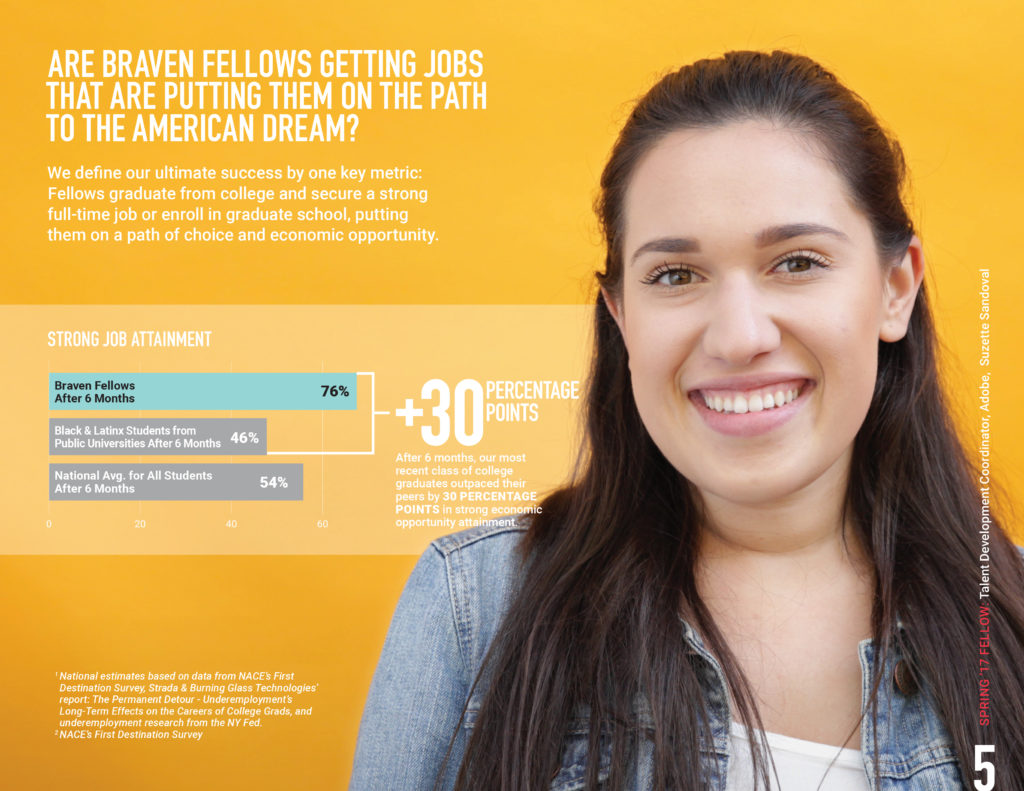Here’s some warm news after the cold snap: Braven, a nonprofit founded in 2013 with a mission to empower first-generation college students, particularly low-income and students of color, just issued a press release regarding its Newark program, which started in 2015.
Braven-Newark today announced that Fellows who graduate from their university-embedded program at Rutgers University-Newark (RU-N) are outpacing their peers by 30 percentage points in strong economic opportunity attainment: six months after college graduation, 76 percent of Braven Fellows from the RU-N class of 2018 have found a strong first job or enrolled in a graduate program, compared to 46 percent of Black and Latinx students from public universities nationally.
The press release follows Braven’s 2019 Jobs Report that says 48 percent of Braven Fellows who completed the two-part experience — it combines online learning modules and weekly in-person Learning Labs with a leadership coach and peer cohort — are already outearning their parents in their first job out of college. By comparison, by age 30, Americans only have a 50-50 shot of outearning their parents.
“These results are a testament to the hard work and determination of our Braven-Newark Fellows,” said Braven’s Newark executive director Vince Marigna. “Braven was founded with the goal of empowering promising college students with the chance to attain the American Dream within five semesters and deepen their impact on our world. In partnership with Rutgers-University-Newark, we’re committed to expanding this work to create a future in which leaders emerge from everywhere.”
Here’s some other impressive results: The U.S. Department of Education maintains a database called a “College Scoreboard” that tracks a variety of factors that reflect college quality including SAT/ACT scores, tuition, school diversity, and graduation rates. The graduation rate at the Rutgers Newark campus is 67 percent. The graduation rate among the Braven Fellows attending the Rutgers-Newark campus since 2015 is 100 percent. Of the 280 fellows enrolled in the program, 69 percent are the first generation in their families to attend college—let alone graduate—and 91 percent are people of color.
Here’s Braven Fellow Dyllan Brown Bramble on the quality of support he derived from the fellowship (he’s now a first year J.D. candidate at Georgetown University Law Center):
The Braven program pushed me to take advantage of the opportunities and resources available to me on campus while staying true to and owning my own story. Without Braven, I would not be where I am right now.
Nancy Cantor, Chancellor of Rutgers University–Newark, one of three Braven partner universities, remarked, “Rutgers-Newark’s partnership with Braven has helped students take meaningful, substantive steps in their career development, which is a significant part of the purpose of a top-notch education we offer our students. We’re very excited about significantly scaling up our work with Braven, so that we may reach as many as 4,000 students by 2022.”
In Newark, Prudential is one of Braven’s most deeply embedded employer partners. Since the partnership began, 14 Braven Fellows have been hired as interns or full-time at Prudential. Prudential employees make up 25 percent of RU-N Leadership Coaches who help develop future leaders while investing in their own management skills.
“Prudential’s partnership with Braven allows us to connect with driven, diverse talent as well as access powerful learning and development opportunities for our current associates through the Leadership Coach and Professional Mentor roles. We are committed to helping the next generation of Newark’s leaders prepare for meaningful careers,” said Rick Radice, Vice President, Legal, Compliance, Business Ethics and External Affairs, Prudential Financial.
There’s so much gloom about the rate of college and career readiness; indeed, the zeitgeist is gradually shifting from “all high school graduates should be ready to attend college if they so choose” to “who needs college?” Maybe that’s a justified course correction. Or maybe it’s a cop to the failure of high schools to effectively teach students the skills they need to succeed.
Example: The average SATs score at a typical Newark high school — I chose Central High School, where Mayor Ras Baraka used to be principal — is 413 in reading and 406 in math. According to the College Board, those combined scores (819) place the average Central High graduate in the 17th percentile among national samples and the 12th percentile among SAT users, or those who want to go to college. Those low percentiles indicate poor readiness for college-level work.
Yet, somehow, Braven’s support network, internship opportunities, and mentoring compensate for what these students didn’t receive pre-college.
And after college? They’re ahead of their peers, regardless of family history and income level.
Maybe we need to stop lowering the bar. Braven’s results show that our kids can reach higher.




1 Comment